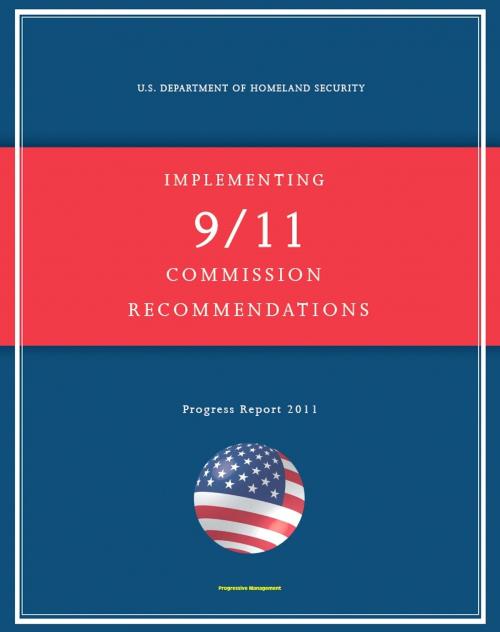2011 Report on Implementing 9/11 Commission Recommendations: U.S. Department of Homeland Security Status Report on Airline Passenger Screening, Aviation Security, NBC Threats, Border Security
Nonfiction, Social & Cultural Studies, Political Science| Author: | Progressive Management | ISBN: | 9781465825407 |
| Publisher: | Progressive Management | Publication: | July 23, 2011 |
| Imprint: | Smashwords Edition | Language: | English |
| Author: | Progressive Management |
| ISBN: | 9781465825407 |
| Publisher: | Progressive Management |
| Publication: | July 23, 2011 |
| Imprint: | Smashwords Edition |
| Language: | English |
In recognition of the 9/11 Commission Report and the tenth anniversary of 9/11, this report - issued in July 2011 - describes how DHS has addressed specific 9/11 Commission recommendations over the past ten years, making America stronger and more resilient. While challenges remain, the Department continues to focus on minimizing risks while maximizing the ability to respond and recover from attacks and disasters of all kinds. This is a challenge that the men and women of DHS commit themselves to everyday. The United States has made significant progress in securing the nation from terrorism since the September 11, 2001 attacks. Nevertheless, work remains as the terrorist threats facing the country have evolved in the last ten years, and continue to change. Following 9/11, the federal government moved quickly to develop a security framework to protect our country from large-scale attacks directed from abroad, while enhancing federal, state, and local capabilities to prepare for, respond to, and recover from threats and disasters at home. A key element of this framework included the creation of the Department of Homeland Security (DHS) in March, 2003, bringing together 22 separate agencies and offices into a single, Cabinet level department (1). Created with the founding principle of protecting the American people from terrorist and other threats, DHS and its many partners across the Federal government, public and private sectors, and communities throughout the country have strengthened the homeland security enterprise to better mitigate and defend against dynamic threats. Many of the features of this new, more robust enterprise align with – and respond to – recommendations contained in the 9/11 Commission Report, released in July 2004 to assess the circumstances surrounding 9/11 and to identify ways to guard against future terrorist attacks.
Contents include: September 11 Chronology * Introduction: Strengthening the Homeland Security Enterprise to Address Evolving Threats * Expanding Information Sharing * Recommendation: Provide Incentives for Information Sharing * Developing and Implementing Risk-Based Transportation Security Strategies * Recommendation: Develop a Risk-Based Plan for Transportation Security * Strengthening Airline Passenger Pre-Screening and Targeting Terrorist Travel * Recommendations: Improve airline passenger pre-screening and target terrorist travel * Enhancing Screening for Explosives * Recommendation: Improve aviation security through enhanced explosive screening * Strengthening Efforts to Detect and Report Biological, Radiological and Nuclear Threats * Recommendation: Strengthen counterproliferation efforts to prevent radiological/nuclear terrorism * Protecting Cyber Networks and Critical Physical Infrastructure * Recommendation: Assess critical infrastructure and readiness * Recommendation: Allocate homeland security funds based on risk * Recommendation: Track and disrupt terrorist financing * Recommendation: Improve interoperable communications at all levels of government * Recommendation: Establish a unified incident command system * Recommendation: Prioritize private sector preparedness * Bolstering the Security of U.S Borders and Identification Documents * Recommendation: Standardize secure identification * Recommendation: Integrate border security into larger network of screening points that include the transportation system and access to vital facilities * Ensuring Robust Privacy and Civil Rights and Civil Liberties Safeguards * Recommendations: Safeguard Individual Privacy When Sharing Information and Maintain Civil Liberties While Protecting Security * Conclusion * Acronym Listing
This is a privately authored news service and educational publication of Progressive Management.
In recognition of the 9/11 Commission Report and the tenth anniversary of 9/11, this report - issued in July 2011 - describes how DHS has addressed specific 9/11 Commission recommendations over the past ten years, making America stronger and more resilient. While challenges remain, the Department continues to focus on minimizing risks while maximizing the ability to respond and recover from attacks and disasters of all kinds. This is a challenge that the men and women of DHS commit themselves to everyday. The United States has made significant progress in securing the nation from terrorism since the September 11, 2001 attacks. Nevertheless, work remains as the terrorist threats facing the country have evolved in the last ten years, and continue to change. Following 9/11, the federal government moved quickly to develop a security framework to protect our country from large-scale attacks directed from abroad, while enhancing federal, state, and local capabilities to prepare for, respond to, and recover from threats and disasters at home. A key element of this framework included the creation of the Department of Homeland Security (DHS) in March, 2003, bringing together 22 separate agencies and offices into a single, Cabinet level department (1). Created with the founding principle of protecting the American people from terrorist and other threats, DHS and its many partners across the Federal government, public and private sectors, and communities throughout the country have strengthened the homeland security enterprise to better mitigate and defend against dynamic threats. Many of the features of this new, more robust enterprise align with – and respond to – recommendations contained in the 9/11 Commission Report, released in July 2004 to assess the circumstances surrounding 9/11 and to identify ways to guard against future terrorist attacks.
Contents include: September 11 Chronology * Introduction: Strengthening the Homeland Security Enterprise to Address Evolving Threats * Expanding Information Sharing * Recommendation: Provide Incentives for Information Sharing * Developing and Implementing Risk-Based Transportation Security Strategies * Recommendation: Develop a Risk-Based Plan for Transportation Security * Strengthening Airline Passenger Pre-Screening and Targeting Terrorist Travel * Recommendations: Improve airline passenger pre-screening and target terrorist travel * Enhancing Screening for Explosives * Recommendation: Improve aviation security through enhanced explosive screening * Strengthening Efforts to Detect and Report Biological, Radiological and Nuclear Threats * Recommendation: Strengthen counterproliferation efforts to prevent radiological/nuclear terrorism * Protecting Cyber Networks and Critical Physical Infrastructure * Recommendation: Assess critical infrastructure and readiness * Recommendation: Allocate homeland security funds based on risk * Recommendation: Track and disrupt terrorist financing * Recommendation: Improve interoperable communications at all levels of government * Recommendation: Establish a unified incident command system * Recommendation: Prioritize private sector preparedness * Bolstering the Security of U.S Borders and Identification Documents * Recommendation: Standardize secure identification * Recommendation: Integrate border security into larger network of screening points that include the transportation system and access to vital facilities * Ensuring Robust Privacy and Civil Rights and Civil Liberties Safeguards * Recommendations: Safeguard Individual Privacy When Sharing Information and Maintain Civil Liberties While Protecting Security * Conclusion * Acronym Listing
This is a privately authored news service and educational publication of Progressive Management.















